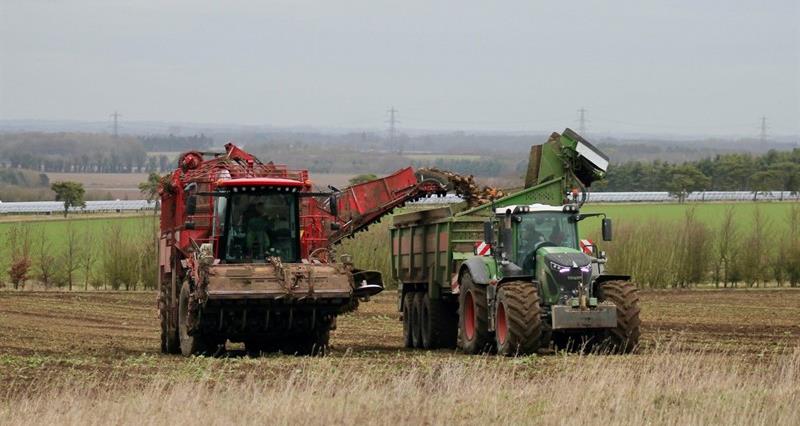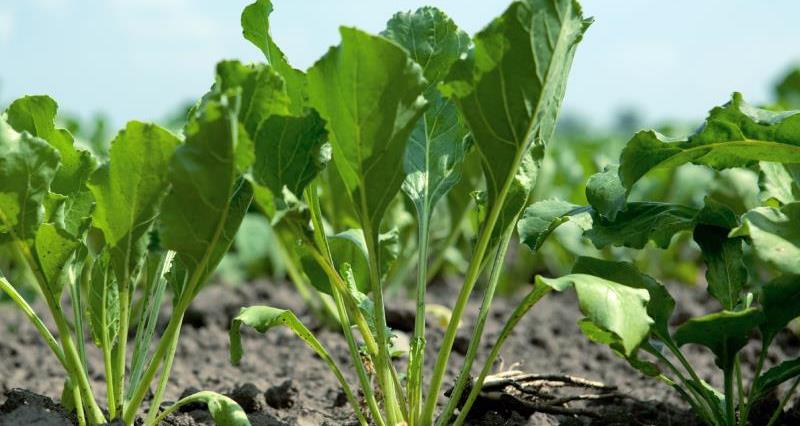What is sugar beet?
Sugar beet is the UK-grown crop that sucrose (what you see in your sugar bowl) is extracted from.
It provides just over half of all the sugar we consume in the UK.
Sugar beet is a large pale brown root crop, akin to a large parsnip and has a sugar content of around 16% when it is harvested. Its large green leaves are like nature’s solar panels, highly optimised for transforming light energy into sugars and fibre.
Sugar beet is primarily grown in the East of England. Sowing takes place in the Spring, with the crop harvested during the sugar ‘campaign’ which runs over winter from October through until March.
Sugar extracted from homegrown sugar beet is sold under the Silver Spoon brand.
The homegrown industry in numbers
| 25 years ago | Today |
| 1.1m–1.4m tonnes | 1.1m–1.4m tonnes |
| 10 factories | 4 factories |
| 193,000 ha | c100,000 ha |
| 10,000 growers | 2,000–2,500 growers |
| Factories run 100 days per year | Factories run 300+ days per year |
| Sugar the primary product | Diversified business |
- The industry supports nearly 2,500 growers, over approximately 100,000 hectares across East Anglia, the East Midlands and Yorkshire, all of whom are Red Tractor assured.
- Growers deliver sugar beet to four British Sugar factories located in Cantley (Norfolk Broads), Bury St Edmunds (Suffolk), Wissington (Norfolk Fen) and Newark (Nottinghamshire). The British Sugar headquarters are in Peterborough.

- The UK sugar beet industry proactively invests more than £2m a year in research and development through the BBRO (British Beet Research Organisation).
- The homegrown sugar industry prides itself on being one of the most efficient in the world. Guided by the work of the BBRO, it has improved sugar beet yields by more than 20% in the past 15 years.
- The industry supports more than 7,000 jobs in the wider UK economy.
- On average, sugar beet travels just 28 miles from field to factory.
- The UK home-grown sugar sector is more than just sugar – 99% of the crop is used, with by-products including animal feed, topsoil, and biofuels.
- The UK production process produces virtually zero waste, with less than 200 grams of waste for every tonne of sugar produced.
The role of NFU Sugar
NFU Sugar is the statutory representative of all sugar beet growers in the UK. As such its role is enshrined in UK law.
It negotiates the terms of the Inter-Professional Agreement, including annual contract prices, on behalf of sugar beet growers with the sole processor of sugar beet in the UK, British Sugar plc.
The collective negotiating power of NFU Sugar represents a vital counter balance to British Sugar’s monopsony in the marketplace.
It also oversees Beet Intake into each of British Sugar’s four sugar factories, ensuring that sampling and testing procedures are undertaken correctly to give growers confidence that they are being paid fairly for every load that they deliver.
Its work is governed by the NFU Sugar Board – a grower representative body elected by growers, for growers.
Benefits of growing sugar beet
Sugar beet is an important break crop in the arable rotation. It provides agronomic benefits, such as increased soil organic matter, as well as the opportunity to manage damaging pests and diseases like blackgrass.
Sugar beet is uniquely well suited to the UK’s maritime climate with its cocktail of sunlight and rainfall optimal for crop development. Mild conditions also allow the crop to continue its development over the winter months, facilitating the longest campaign in Europe.
Harvested through the winter, its place within the rotation is equally important to growers with regards workload and cashflow at what can otherwise be a very challenging time of year.
Other break crops, such as OSR (oilseed rape) can be used, but increasing pest and disease pressure mean that it is becoming harder for farmers to grow these alternatives.
During the sugar beet harvest, a quarter of the world’s pink-footed geese, as well as several breeds of swan, forage on the beet tops that have been left behind when the root is lifted.
Any residual organic matter is returned to the soil improving both its structure and nutrient content.
Modern beet harvesting technology minimises soil disturbance whilst ensuring that an absolute minimum of soil leaves the field. Any soil which reaches the factory is recycled as high-quality topsoil.
Did you know? British Sugar topsoil was used to landscape the Olympic Park
Importance of break crops
Farmers ‘rotate’ the crop planted in a field each year to prevent the build up of pests and diseases.
A typical rotation may include wheat, barley and oats with sugar beet acting as the break crop, offering a hiatus from the pests and weeds that affect the cereal crops.
What happens in a sugar factory?
Sugar beet factories usually begin processing sugar during October and finish by the following March – this period is called the ‘campaign’.
During this time, the farm harvests the sugar beet and briefly places it into a pile known as a clamp where the beet is accumulated before being loaded onto lorries and taken to the factory.
Once in the factory, the sugar is extracted by special machines and the by-products are separated so they can be sold into a multitude of industries including animal feed and cosmetics.
The extracted sugar is then either packaged and sent to supermarkets or sent in bulk to food manufacturers. Meanwhile, on farm, the whole process begins again with crops such as spring barley being sown into the recently harvested field.
The UK market explained
The UK population consumes around 1.8 million tonnes of sugar each year in cups of tea, cakes, biscuits, and other foodstuffs.
While per capita sugar consumption is in long-term decline, this is largely offset by an increasing population and there remains strong demand for sustainably sourced, homegrown product.
The below graph does not equal demand – it is consumption of all added sugars and does not account for import/export of products.

Source: Defra family food survey (non-milk extrinsic sugars); ONS
British Sugar Plc produces approximately 1 million tonnes of white sugar per year. The UK imports about 40% of its domestically consumed sugar.
Of the sugar that is imported:
- About half currently comes from sugar cane. It is imported from around the world and refined on the banks of the Thames by Tate and Lyle, owned by American Sugar Refiners.
- About half is European beet sugar (mainly from France).
British Sugar produces white sugar in the UK, which is either directly sold to manufacturing or sold to the general public via the retail brand Silver Spoon.

Source: HMRC trade data
*Raw sugar imports in white sugar equivalent



